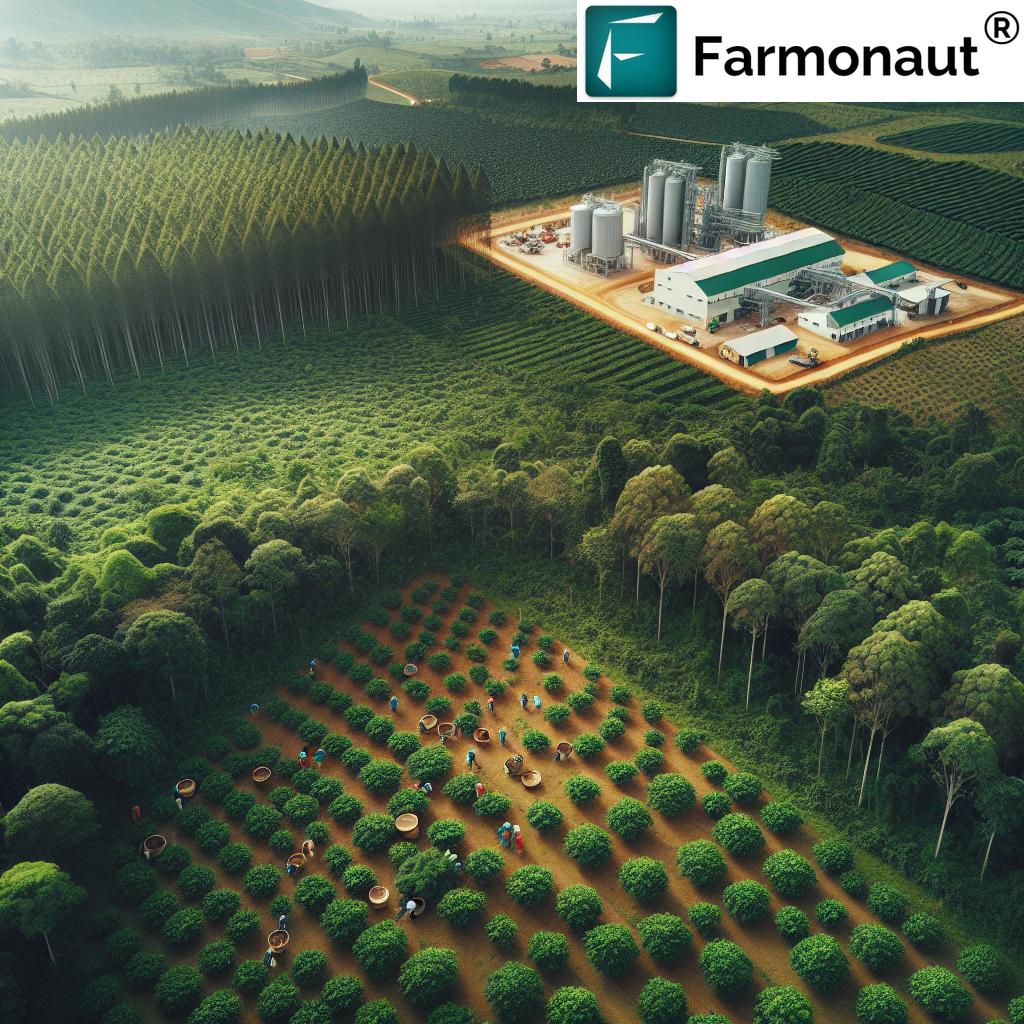Zimbabwe’s New Land Tenure System: Balancing Agricultural Investment and Local Control
“Zimbabwe’s new land tenure system aims to convert 99-year leases into transferable documents, potentially affecting thousands of farmers.”
Welcome to our comprehensive analysis of Zimbabwe’s groundbreaking land tenure reforms. As experts in agricultural technology and sustainable farming practices, we at Farmonaut are closely monitoring these developments and their potential impact on the future of agriculture in the country. In this blog post, we’ll delve into the intricacies of Zimbabwe’s proposed hybrid land tenure system, exploring how it aims to strike a balance between encouraging agricultural investment and maintaining local control over this vital resource.
Understanding the Need for Land Tenure Reform in Zimbabwe
Zimbabwe’s agricultural sector has long been a cornerstone of its economy, but challenges in land ownership and management have hindered its full potential. The government’s recent initiative to develop a new land tenure system is a testament to its commitment to addressing these issues head-on. Let’s explore the key drivers behind this reform:
- Enhancing agricultural land ownership rights
- Improving the bankability of agricultural land
- Encouraging investment in the agricultural sector
- Maintaining local control over land resources
- Reinforcing the Land Reform Programme
These objectives form the foundation of the proposed hybrid land tenure model, which combines elements of freehold and other landholding arrangements. This innovative approach aims to create a more flexible and economically viable system for Zimbabwe’s farmers and agricultural stakeholders.
Key Components of the New Land Tenure System
The proposed land tenure system in Zimbabwe introduces several significant changes to the current framework. Here are the primary components that we believe will shape the future of agricultural land ownership and management in the country:
- Conversion of Existing Documents: Holders of 99-year leases, offer letters, and permits will have the opportunity to convert these into bankable, registrable, and transferable documents. This change is expected to enhance the value and utility of agricultural land holdings.
- Government Approval for Transfers: The sale or transfer of agricultural land will require government authorization, ensuring that the state maintains oversight of land transactions.
- Restrictions on Foreign Ownership: The new system will prohibit the transfer of agricultural land to non-Zimbabweans, safeguarding local control over this crucial resource.
- Regulation of Company Ownership Structures: The reforms will address the use of company ownership structures to bypass transfer restrictions, closing potential loopholes in the system.
- Establishment of the Land Tenure Implementation Committee: A dedicated technical team will oversee the execution of these reforms, ensuring a smooth transition to the new system.
These components collectively aim to create a more robust and transparent land tenure system that aligns with Zimbabwe’s national interests while promoting agricultural development.

The Role of Government in the New Land Tenure System
The Zimbabwean government plays a crucial role in shaping and implementing the new land tenure system. Various ministries and committees are involved in this process, each contributing to different aspects of the reform:
- Ministry of Lands, Agriculture, Fisheries, Water and Rural Development: Overseeing agricultural policy and land management
- Ministry of Local Government and Public Works: Ensuring alignment with local governance structures
- Ministry of Justice, Legal and Parliamentary Affairs: Handling legal aspects and legislative changes
- Land Tenure Implementation Committee: Coordinating the execution of reforms
- Cabinet Oversight Committee: Providing high-level guidance and approval
This collaborative approach demonstrates the government’s commitment to creating a comprehensive and well-coordinated land tenure system that addresses the needs of all stakeholders.
Implications for Agricultural Investment and Productivity
The proposed land tenure reforms have significant implications for agricultural investment and productivity in Zimbabwe. By enhancing the bankability and transferability of agricultural land, the new system is expected to:
- Attract more investment into the agricultural sector
- Improve access to financing for farmers
- Encourage long-term planning and sustainable farming practices
- Boost agricultural productivity and output
- Strengthen Zimbabwe’s food security and export potential
These potential benefits align well with Farmonaut’s mission to support sustainable and efficient farming practices through innovative technology solutions.
Balancing Local Control and Foreign Investment
One of the key challenges in Zimbabwe’s land tenure reform is striking the right balance between maintaining local control over agricultural land and attracting necessary foreign investment. The proposed system addresses this through several mechanisms:
- Prohibiting direct foreign ownership of agricultural land
- Requiring government approval for land transfers
- Regulating company ownership structures to prevent circumvention of rules
- Encouraging partnerships and joint ventures that benefit local farmers
This approach aims to protect Zimbabwe’s sovereignty over its land resources while still creating opportunities for foreign expertise and capital to contribute to the country’s agricultural development.
“The proposed reforms in Zimbabwe prohibit 100% of foreign agricultural land purchases to maintain local control.”
Stakeholder Consultation and Policy Development
The Zimbabwean government recognizes the importance of inclusive policy development in creating an effective and widely accepted land tenure system. As part of this process, they plan to consult with key stakeholders, including:
- Farmers and agricultural associations
- Traditional leaders
- Financial institutions
- Legal experts
- Agricultural researchers and academics
This consultative approach ensures that the new land tenure system addresses the diverse needs and concerns of all parties involved in Zimbabwe’s agricultural sector.
Legislative Framework and Implementation Timeline
The implementation of Zimbabwe’s new land tenure system will require careful planning and execution. Here’s an overview of the legislative process and expected timeline:
- Policy Framework Development: Ongoing consultations and drafting of detailed policy proposals
- Legislative Changes: Preparation and submission of necessary amendments to existing laws
- Parliamentary Approval: Debate and voting on the proposed legislation in Parliament
- Implementation Planning: Development of detailed implementation strategies and timelines
- Phased Rollout: Gradual introduction of the new system, likely starting with pilot regions
While specific dates have not been announced, the government has indicated that the process is already underway, with some preparatory work being carried out by relevant ministries.

Comparative Analysis: Current vs. Proposed Land Tenure Systems
To better understand the implications of the proposed reforms, let’s compare key aspects of the current and new land tenure systems in Zimbabwe:
| Features | Current System | Proposed Hybrid System |
|---|---|---|
| Land Ownership Rights | Limited transferability of 99-year leases | Enhanced transferability and bankability of leases |
| Transferability | Restricted, requires government approval | More flexible, but still requires government authorization |
| Foreign Ownership | Limited restrictions | Strict prohibition on foreign agricultural land purchases |
| Investment Potential | Moderate due to ownership uncertainties | Potentially higher due to improved bankability |
| Local Control | Strong government oversight | Maintained government control with more structured processes |
| Document Convertibility | Limited options for lease conversion | Provision for converting leases into transferable documents |
This comparison highlights the potential for increased agricultural investment and productivity under the new system, while maintaining strong safeguards for local control over land resources.
The Role of Technology in Supporting the New Land Tenure System
As Zimbabwe embarks on this ambitious land tenure reform, the role of agricultural technology becomes increasingly important. At Farmonaut, we believe that our precision agriculture solutions can play a crucial role in helping farmers and policymakers maximize the benefits of the new system. Here’s how our technology can support sustainable land management and increased agricultural efficiency:
- Satellite-Based Crop Monitoring: Our advanced satellite imagery technology allows farmers to monitor crop health in real-time, enabling more efficient use of agricultural land.
- AI-Powered Advisory Systems: Our Jeevn AI system provides personalized recommendations to farmers, helping them make informed decisions about crop management and resource allocation.
- Blockchain-Based Traceability: Our blockchain solutions can enhance transparency in land ownership and transfers, supporting the government’s efforts to regulate agricultural land transactions.
- Resource Management Tools: Our platform offers tools for optimizing water usage, fertilizer application, and other critical resources, promoting sustainable farming practices.
By leveraging these technologies, Zimbabwean farmers can make the most of their land holdings under the new tenure system, potentially increasing productivity and sustainability.
Challenges and Considerations in Implementing the New System
While the proposed land tenure reforms offer significant potential benefits, their implementation is likely to face several challenges. It’s important to consider these factors as the new system takes shape:
- Administrative Capacity: Ensuring government agencies have the resources and expertise to manage the new system effectively
- Legal Complexities: Navigating the intricacies of changing land ownership laws and regulations
- Stakeholder Resistance: Addressing concerns from various groups who may be affected by the changes
- Economic Impact: Managing potential short-term disruptions as the system transitions
- International Perceptions: Balancing the need for local control with the desire to attract foreign investment
Addressing these challenges will require careful planning, ongoing dialogue with stakeholders, and potentially phased implementation of the new system.
The Future of Agriculture in Zimbabwe
As we look to the future, the proposed land tenure reforms have the potential to significantly reshape Zimbabwe’s agricultural landscape. Here are some key trends and opportunities we anticipate:
- Increased Agricultural Productivity: With more secure land rights and better access to financing, farmers may be more inclined to invest in long-term improvements and technologies.
- Diversification of Crops: Enhanced land security could encourage farmers to experiment with a wider range of crops, potentially boosting Zimbabwe’s agricultural exports.
- Technological Adoption: The new system may facilitate greater adoption of precision agriculture technologies, like those offered by Farmonaut, leading to more efficient and sustainable farming practices.
- Rural Development: Improved agricultural productivity could spur broader rural development, creating new opportunities in agro-processing and related industries.
- Environmental Stewardship: With more secure tenure, farmers may be more inclined to invest in sustainable land management practices, benefiting long-term environmental health.
These potential outcomes align well with Zimbabwe’s broader goals of food security, economic growth, and sustainable development.
Farmonaut’s Commitment to Supporting Sustainable Agriculture
At Farmonaut, we are committed to supporting farmers and agricultural stakeholders as they navigate these changes in Zimbabwe’s land tenure system. Our suite of precision agriculture tools is designed to help farmers maximize productivity, reduce resource waste, and make data-driven decisions. Here’s how we can contribute to the success of the new land tenure system:
- Crop Monitoring: Our satellite-based crop health monitoring system can help farmers and policymakers track the impact of land tenure changes on agricultural productivity.
- Resource Optimization: Our AI-powered advisory system can guide farmers in making the most efficient use of their land and resources under the new tenure arrangements.
- Data-Driven Decision Making: By providing real-time insights on crop health, weather patterns, and market trends, we empower farmers to make informed decisions about their land use and investments.
- Sustainable Practices: Our platform promotes sustainable farming methods, aligning with Zimbabwe’s goals for long-term agricultural development and environmental stewardship.
We believe that by combining innovative land tenure policies with advanced agricultural technologies, Zimbabwe can unlock the full potential of its agricultural sector.
Conclusion: A New Era for Zimbabwean Agriculture
Zimbabwe’s proposed hybrid land tenure system represents a bold step towards addressing long-standing challenges in the country’s agricultural sector. By balancing the need for increased investment with the imperative of maintaining local control, this new approach has the potential to usher in a new era of agricultural productivity and sustainability.
As the government moves forward with stakeholder consultations and legislative processes, it will be crucial to maintain transparency and inclusivity. The success of this reform will depend on the careful consideration of all perspectives and the ability to adapt the system as needed.
At Farmonaut, we remain committed to supporting Zimbabwean farmers and agricultural stakeholders through this transition. Our precision agriculture solutions are designed to complement the goals of the new land tenure system, helping to maximize productivity, promote sustainability, and drive economic growth in the agricultural sector.
As Zimbabwe embarks on this exciting journey of land tenure reform, we look forward to playing our part in building a more prosperous and sustainable agricultural future for the nation.
Frequently Asked Questions (FAQ)
- Q: What is the main goal of Zimbabwe’s new land tenure system?
A: The main goal is to enhance agricultural land ownership rights and bankability while maintaining local control over land resources. - Q: Will foreign investors be able to purchase agricultural land under the new system?
A: No, the proposed reforms prohibit the transfer of agricultural land to non-Zimbabweans to maintain local control. - Q: How will the new system affect current holders of 99-year leases?
A: Current holders will have the opportunity to convert their leases into bankable, registrable, and transferable documents. - Q: Who will oversee the implementation of the new land tenure system?
A: A Land Tenure Implementation Committee, comprising representatives from various ministries, will oversee the execution of these reforms. - Q: How can technology support the new land tenure system?
A: Technologies like Farmonaut’s precision agriculture solutions can help farmers maximize productivity and sustainability under the new system.
















